
Allen Fort (July 14, 1849 - April 20, 1907) was a judge, railroad commission founder and member, and state legislator in Georgia. [1] [2]

Allen Fort (July 14, 1849 - April 20, 1907) was a judge, railroad commission founder and member, and state legislator in Georgia. [1] [2]
Fort was born near Lumpkin, Georgia July 14, 1849. [2] [3] He received a first class honors degree from the University of Georgia in 1867. [4] While at the university he was the co-founder of the local chapter of Sigma Alpha Epsilon. [3] After he obtained his degree he went to Americus and was admitted to the bar. [3]
He was a delegate to the State Democratic Convention in June 1872 representing Sumter County. [5] Later the same year he was elected to the Georgia House of Representatives to represent Sumter County as a Democrat. [6] He was re-elected to the legislature several times [3] including to the Georgia Senate. [4]
Fort was made judge of the southwestern circuit in 1882 and was the youngest member of the bench. [3] He made a run for congress in 1896 to fill the vacated seat of Charles R. Crisp [7] but was defeated by Elijah B. Lewis. [4] He served as circuit judge until 1991 when he left to become a railroad commossioner. [3]
He had eight children, [1] including Hollis Fort, [2] who was also a Sumter County lawyer and state legislator. [8]
Fort died April 20, 1907 from pneumonia at his home in Americus. He was survived by his wife and six children. [4] He was buried in Oak Grove cemetery. [4]

Americus is the county seat of Sumter County, Georgia, United States. As of the 2020 census, the city had a population of 16,230. It is the principal city of the Americus Micropolitan Statistical Area, a micropolitan area that covers Schley and Sumter counties and had a combined population of 36,966 at the 2000 census.
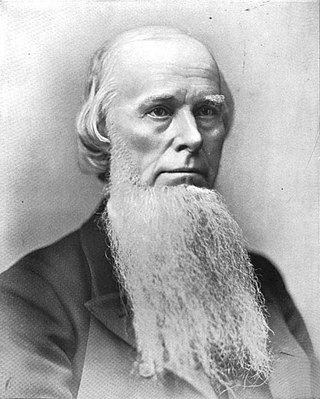
Joseph Emerson Brown, often referred to as Joe Brown, was an American attorney and politician, serving as the 42nd Governor of Georgia from 1857 to 1865, the only governor to serve four terms. He also served as a United States Senator from that state from 1880 to 1891.
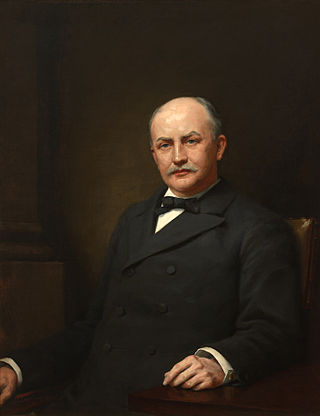
Charles Frederick Crisp was a British-American political figure. A member of the Democratic Party, Crisp was elected as a congressman from Georgia in 1882, and served until his death in 1896. From 1890 to 1895, he led the Democratic Party in the House, as either the speaker of the House or House minority leader. He was the father of Charles R. Crisp who also served in Congress.

Griffin Boyette Bell was the 72nd Attorney General of the United States, having served under President Jimmy Carter. Previously, he was a U.S. circuit judge of the United States Court of Appeals for the Fifth Circuit.

John Ireland was the 18th Governor of Texas from 1883 to 1887. During Ireland's term, the University of Texas was established, and construction on the Texas State Capitol began. Ireland is credited with the selection of local pink granite as the construction material.
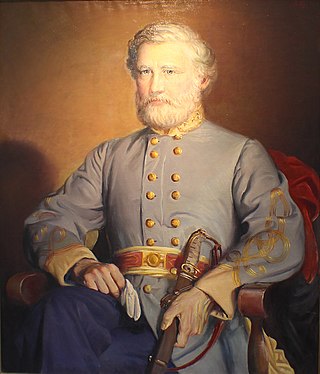
Henry Lewis Benning was a general in the Confederate States Army. He also was a lawyer, legislator, and judge on the Georgia Supreme Court. He commanded "Benning's Brigade" during the American Civil War. Following the Confederacy's defeat at the end of the war, he returned to his native Georgia, where he lived out the rest of his life. Fort Benning was named in his honor until 2023, when it was redesignated Fort Moore.
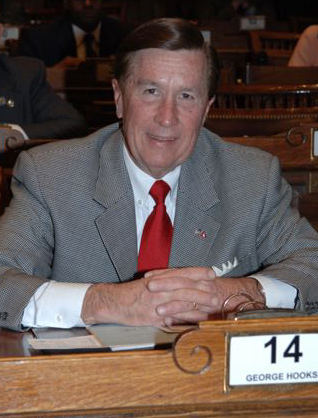
George Hooks is an American politician and Democratic former member of the Georgia State Senate, representing the 14th District from 1991 through 2013. Previously he was a member of the Georgia House of Representatives from 1980 through 1990.

James Milton Smith was a Confederate infantry colonel in the American Civil War, as well as a post-war Governor of Georgia.

The Georgia Republican Party is the affiliate of the Republican Party in the U.S. state of Georgia and one of the two major political parties. It is the current favored party in the state and is chaired by Joshua McKoon.
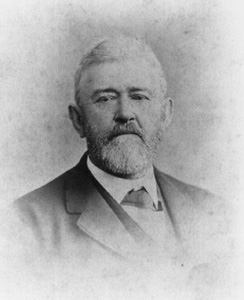
Richard Francis Lyon (1819–1893) was a Georgia attorney and jurist before and during the Confederacy. He was the mayor of Albany, Georgia, from 1858 to 1859 and an associate justice of the Supreme Court of Georgia from 1859 to 1865.
More than 1,500 African American officeholders served during the Reconstruction era (1865–1877) and in the years after Reconstruction before white supremacy, disenfranchisement, and the Democratic Party fully reasserted control in Southern states. Historian Canter Brown Jr. noted that in some states, such as Florida, the highest number of African Americans were elected or appointed to offices after the end of Reconstruction in 1877. The following is a partial list of notable African American officeholders from the end of the Civil War until before 1900. Dates listed are the year that a term states or the range of years served if multiple terms.

Asa Lawrence Lovejoy was an American pioneer and politician in the region that would become the U.S. state of Oregon. He is best remembered as a founder of the city of Portland, Oregon. He was an attorney in Boston, Massachusetts before traveling by land to Oregon; he was a legislator in the Provisional Government of Oregon, mayor of Oregon City, and a general during the Cayuse War that followed the Whitman massacre in 1847. He was also a candidate for Provisional Governor in 1847, before the Oregon Territory was founded, but lost that election.
At the end of the American Civil War, the devastation and disruption in the state of Georgia were dramatic. Wartime damage, the inability to maintain a labor force without slavery, and miserable weather had a disastrous effect on agricultural production. The state's chief cash crop, cotton, fell from a high of more than 700,000 bales in 1860 to less than 50,000 in 1865, while harvests of corn and wheat were also meager. The state government subsidized construction of numerous new railroad lines. White farmers turned to cotton as a cash crop, often using commercial fertilizers to make up for the poor soils they owned. The coastal rice plantations never recovered from the war.

The Constitution of the State of West Virginia is the supreme law of the U.S. state of West Virginia. It expresses the rights of the state's citizens and provides the framework for the organization of law and government. West Virginia is governed under its second and current constitution, which dates from 1872. The document includes fourteen articles and several amendments.
Mable Thomas is an American politician serving as a member of the Georgia House of Representatives for District 56. She previously represented District 55, which includes areas immediately west and southwest of Downtown Atlanta and areas west and northwest of Midtown Atlanta.

Nathan Crawford Barnett was a state legislator and long serving Secretary of State in the U.S. State of Georgia. He is remembered as the man who twice saved the Great Seal of the State of Georgia.
The Americus movement was a civil rights protest that began in Americus, Georgia, United States, in 1963 and lasted until 1965. It was organized by the Student Nonviolent Coordinating Committee along with the NAACP. Its main goals were voter registration and a citizenship education plan.
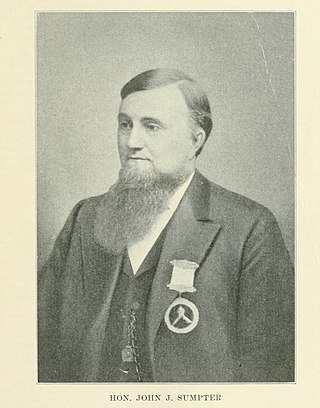
John J. Sumpter was a lawyer and state legislator in Arkansas, military colonel, hotel proprietor, and lived in Hot Springs, Arkansas, for nearly all of his life. He served in the Arkansas House of Representatives and the Arkansas Senate.

Will Jones was an African-American man who was lynched in Ellaville, Schley County, Georgia by a white mob on February 13, 1922. According to the United States Senate Committee on the Judiciary it was the 13th of 61 lynchings during 1922 in the United States.
W. H. Rogers was an American politician. He was a state legislator in Georgia and was the only African-American to serve in the 99th Georgia State Assembly. He represented McIntosh County, Georgia from 1902 until 1907.